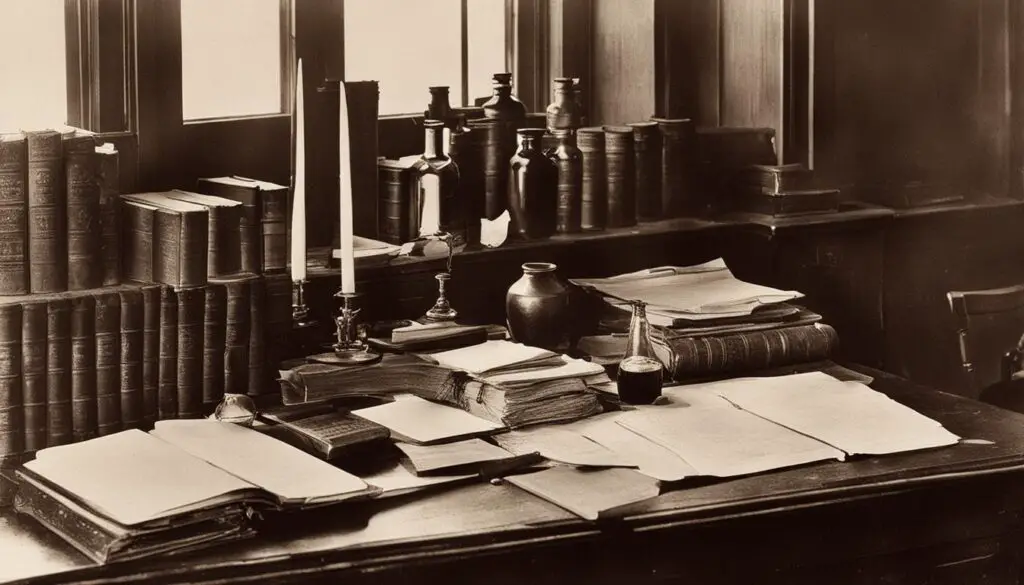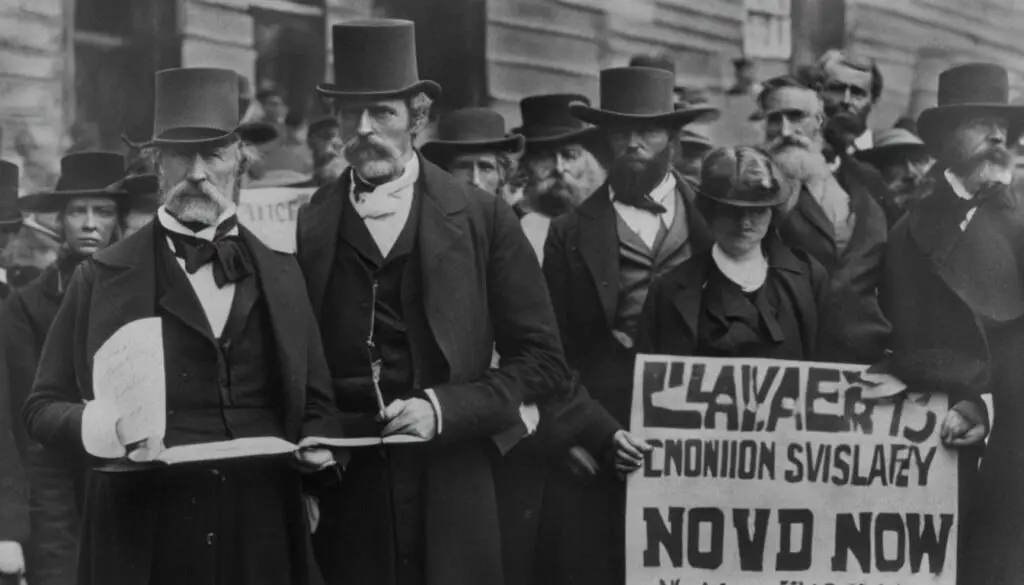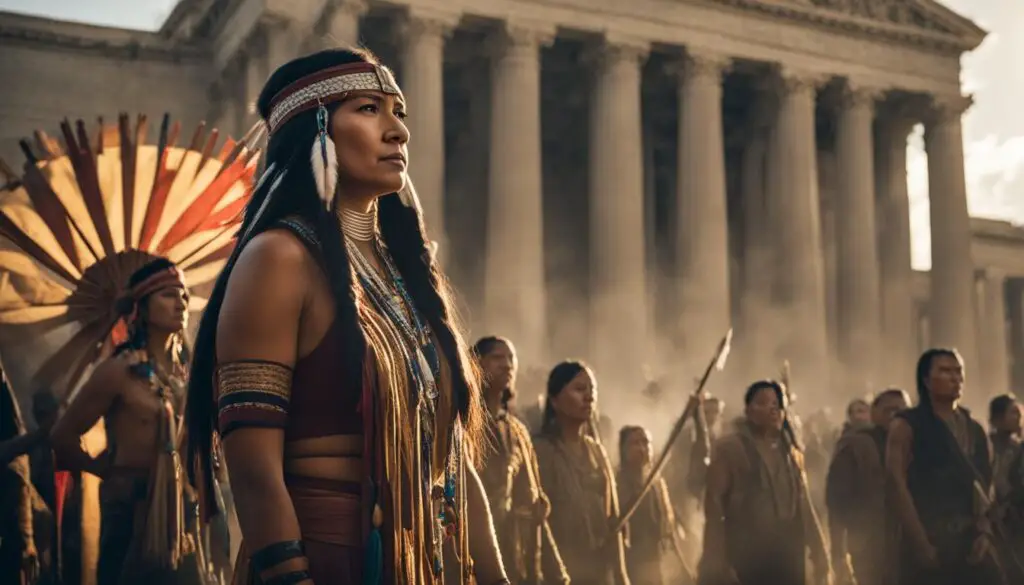Lydia Maria Child was a remarkable American author, abolitionist writer, and progressive social reformer whose influence continues to resonate today. Through her powerful works of literature, Child advocated for equality, justice, and the rights of marginalized groups. Her dedication to social reform, coupled with her trailblazing approach to writing, made her one of the most influential voices of the 19th century.
Child’s body of work encompassed a wide range of genres, including historical novels, children’s literature, and essays on social issues. She fearlessly tackled controversial topics and used storytelling as a means to convey radical ideas to a broad audience. In her novels, such as “Hobomok, A Tale of Early Times,” she explored themes of race, gender, and social injustice, challenging the status quo and providing a unique perspective on American history.
As a passionate abolitionist, Child dedicated her writings to the fight against slavery. Her book “An Appeal in Favor of That Class of Americans Called Africans” was a powerful call for the immediate emancipation of enslaved individuals and established her as one of the first white American women to openly support abolition. Through her activism, she contributed to the changing attitudes towards slavery and played a significant role in shaping public opinion.
Child’s core values and principles centered around equality, justice, and compassion. She believed in the power of literature to inspire change and challenge societal norms. Her commitment to advocating for the rights of Native Americans also left a lasting impact. In her book “An Appeal for the Indians,” she fought against the injustices faced by Native communities, urging government officials and religious leaders to bring about justice and equality.
Lydia Maria Child’s legacy is one of resilience, creativity, and unwavering dedication to social reform. Her work continues to inspire generations of writers and activists, reminding us of the power of words and the importance of using our voices to champion change. Through her writings and advocacy, Child made a profound impact on American society, leaving behind a remarkable legacy that serves as a beacon of hope and a call to action.
Key Takeaways:
- Lydia Maria Child was a prominent American author, abolitionist writer, and progressive social reformer.
- She used her writing to advocate for the rights of marginalized groups, including enslaved peoples, Native Americans, and women.
- Child’s works encompassed various genres and tackled controversial topics such as interracial marriage and the conditions of women throughout history.
- She played a pivotal role in the abolitionist movement, advocating for the immediate emancipation of enslaved individuals.
- Child’s legacy is one of resilience, creativity, and social change, inspiring future generations to use their voices for justice and equality.
Early Life and Education
Lydia Maria Child, born on February 11, 1802 in Medford, Massachusetts, grew up in a family of six children. Her father, Convers Francis, was a religiously orthodox man, and her mother passed away when Lydia was 12. Despite the challenges she faced, Lydia’s upbringing instilled in her a strong sense of compassion and empathy for others.
During her teenage years in Maine, Lydia developed a passion for freedom and social justice. She became acutely aware of the struggles faced by Native Americans and their mistreatment by the government. This awareness would greatly influence her future writings and activism.
Lydia’s brother, Convers Francis, a Unitarian minister, played a significant role in her education and intellectual development. He encouraged her love for learning and nurtured her burgeoning talent for writing. With her brother’s guidance, Lydia cultivated her literary skills and began to explore themes of equality and justice in her early works.

Despite the limited formal education available to young women during that time, Lydia was able to pursue her thirst for knowledge. She devoured books and engaged in self-study, broadening her understanding of the world and refining her writing abilities.
Lydia Maria Child’s early life and education shaped the principles and values she would champion throughout her career. The compassion instilled in her from a young age, coupled with her intellectual curiosity, laid the foundation for her future accomplishments as an abolitionist writer and social reformer.
Literary Career Begins
At the age of 22, Lydia Maria Child made a remarkable entry into the Boston literary world with her debut novel, “Hobomok, A Tale of Early Times.” This groundbreaking work, set in the early settlement of Salem, Massachusetts, provided a fresh and unique perspective on American history by focusing on the experiences of women. Child’s courage to explore scandalous subject matter, such as interracial marriage, both attracted controversy and garnered success.
Revolving around the captivating character of Mary Conant, the story delves into her forbidden love for a Native American man named Hobomok. The novel beautifully navigates through the complexities of identity, racial dynamics, and societal norms of the time. It offers readers a thought-provoking exploration of the clash between tradition and the pursuit of personal freedom.

“Hobomok” holds a significant place in literary history as it’s recognized as the first American historical novel set in New England. Through this path-breaking work, Lydia Maria Child paved the way for the emergence of the historical fiction genre in American literature. Her novel laid the groundwork for the inclusion of reformist themes and social commentary that would continue to permeate her future writings.
Impact in Children’s Literature
Lydia Maria Child’s contributions to children’s literature were truly remarkable. She pioneered a new era in American children’s literature with her groundbreaking work. Child’s dedication to nurturing young minds led her to edit and publish the first American children’s magazine, The Juvenile Miscellany.

This bimonthly publication captivated young readers by addressing important American issues and instilling core American values. Through her writing, Child aimed to spark curiosity, foster imagination, and ignite a sense of civic responsibility in children.
“Children are like tender plants; they require encouragement and care, and what a world of good correct reading will perform for them.” – Lydia Maria Child
Child’s literature for children filled a void in the market and quickly gained popularity among families in a democratic republic. Her captivating stories, engaging poetry, and moral lessons resonated with young readers and provided them with the tools to navigate the world around them. Moreover, Child’s ability to convey profound ideas in a way that was both entertaining and educational made her an influential figure in children’s literature.
| Key Achievements | Impact in Society |
|---|---|
| Editing and publishing the first American children’s magazine | Transforming children’s literature in America |
| Addressing important American issues in children’s literature | Instilling core American values in young readers |
| Filling a void in the market for children’s literature | Captivating young readers and inspiring their curiosity |
Through her dedication and innovation, Child’s impact in children’s literature continues to be felt today. Her literary works have influenced subsequent generations of children’s authors and remain cherished classics loved by both children and adults. The legacy of Lydia Maria Child in children’s literature serves as a reminder of the profound impact that literature can have on shaping young minds and fostering a love for reading.
Marriage and Activism
In 1828, Lydia Maria Child married David Lee Child, a lawyer and newspaperman. Despite her husband’s debts and financial instability, Child continued to pursue her writing career. She became increasingly involved in the abolitionist movement, publishing the influential book “An Appeal in Favor of That Class of Americans Called Africans” in 1833. This work advocated for the immediate emancipation of enslaved individuals and established Child as one of the first white American women to openly support abolition.
Child’s marriage to David Lee Child provided both challenges and opportunities for her activism. While her husband’s financial struggles placed a burden on their household, Child remained committed to her writing and to advocating for the rights of enslaved Americans. Her book, “An Appeal in Favor of That Class of Americans Called Africans,” was a groundbreaking work that exposed the cruelties of slavery and called for its immediate end.
“I appeal to their own sense of what is right and wrong,” Child wrote in her book. “I appeal to their love of liberty. … I appeal to their independence of mind. … Let those who have, advocate; let those who want, give; let those who are well, do; … till full justice is done in these cases.”
This passionate call for justice resonated with readers and established Child as a prominent abolitionist voice. At a time when women’s voices were often silenced, Child fearlessly used her platform to speak out against slavery and champion the rights of marginalized individuals.
“An Appeal in Favor of That Class of Americans Called Africans” challenged the prevailing societal norms and sparked intense discussions about the abolitionist cause. This book not only showcased Child’s powerful writing style but also brought attention to the inhumanity of slavery and the urgent need for its eradication. By openly supporting abolition, Child shattered stereotypes and paved the way for future generations of activists and reformers.

Impact and Legacy
Lydia Marie Child’s marriage to David Lee Child influenced her activism and writing career. Through her marriage, she gained a deeper understanding of the social and political landscape, which fueled her passion for justice and equality. Child’s unwavering commitment to the abolitionist movement and her powerful writing continue to inspire activists and readers today. Her book, “An Appeal in Favor of That Class of Americans Called Africans,” remains a testament to her dedication to the cause of emancipation and her enduring legacy as a progressive social reformer.
| Impact | Legacy |
|---|---|
| Challenged societal norms by openly supporting abolition | Inspired future generations of activists and reformers |
| Brought attention to the inhumanity of slavery | Continues to be celebrated as a literary voice and influential figure in American history |
| Spark intense discussions and debates about the abolitionist cause | Her works inspire change and challenge societal norms |
Women’s Rights and Social Reform
Lydia Maria Child was not only an advocate for the abolition of slavery but also a passionate supporter of women’s rights. She recognized the inherent inequalities faced by women throughout history and dedicated herself to improving their condition. In her influential book, The History of the Condition of Women in Various Ages and Nations (1835), Child delved into the status of women across different cultures and time periods, shedding light on their struggles and advocating for greater equality.
Child firmly believed that women should receive education and be empowered to support themselves. She emphasized the importance of inclusion by advocating for women’s participation in all aspects of society, including politics, education, and the workforce. For Child, achieving women’s equality was not only a matter of justice, but also a means to create a more just and prosperous society as a whole.
Child’s groundbreaking work laid the foundation for future advancements in women’s rights and inspired generations of activists. Her tireless advocacy and commitment to social reform challenged deeply ingrained patriarchal norms and paved the way for progress.
| Key Achievements | Core Values and Principles |
|---|---|
| Published The History of the Condition of Women in Various Ages and Nations, highlighting the struggles and achievements of women throughout history. | Gender equality, empowerment through education, inclusion in all aspects of society. |
| Pioneered the concept of women’s rights activism, inspiring future generations of activists. | Justice, equality, social reform. |
| Advocated for women’s education and economic independence, recognizing the importance of financial empowerment. | Self-reliance, economic freedom, equal opportunities. |
Child’s legacy in the fight for women’s rights continues to resonate today. Her work serves as a reminder that progress is possible when individuals have the courage to challenge oppressive systems and advocate for equality. By studying Child’s example, we can learn the importance of amplifying marginalized voices, promoting education and empowerment, and working towards a more inclusive and just society.
Native American Advocacy
Lydia Maria Child’s activism extended beyond her advocacy for the abolition of slavery. She was also a passionate supporter of Native American rights. Child vehemently opposed the government’s oppressive policies, particularly the forced removal of the Cherokee people from their tribal lands.
In her influential book, An Appeal for the Indians, Child called on government officials and religious leaders to bring justice to American Indians. She eloquently pleaded for the fair treatment of Native Americans and sought to raise awareness about their plight.
“We must act on behalf of the wronged, we must advocate the rights of the Indians,” Child wrote. Her powerful words inspired other activists and brought attention to the struggles faced by Native Americans.
Child’s advocacy for Native American rights left a lasting impact on the movement. Her compassion, determination, and willingness to speak out against injustice serve as a reminder of the importance of standing up for marginalized communities.

| Lydia Maria Child’s Contributions to Native American Advocacy | Impact |
|---|---|
| 1. An Appeal for the Indians: Child’s book shed light on the mistreatment of Native Americans and called for social justice. | 1. Inspired Change: Her writings inspired others to join the cause and advocate for Native American rights. |
| 2. Challenging Oppressive Policies: Child vehemently opposed the forced removal of Native Americans from their ancestral lands. | 2. Increased Awareness: Child’s activism helped raise public awareness about the struggles faced by Native Americans. |
| 3. Amplifying Native Voices: Child used her platform to amplify the voices of Native American communities and shed light on their experiences. | 3. Lasting Impact: Her work continues to inspire activists and advocate for Native American rights today. |
Literary Legacy
Lydia Maria Child’s literary legacy is one that continues to inspire and captivate readers today. Through her diverse body of work, encompassing multiple genres and exploring a wide range of topics, Child left an indelible mark on American literature.
Child’s writings spanned various genres, from historical novels that shed light on pivotal moments in American history to thought-provoking children’s literature that aimed to instill American values and ideals in young readers.
However, it was Child’s commitment to social reform and her unwavering dedication to advocating for equality and justice that truly set her apart. Her poignant words challenged the prevailing status quo, sparking conversations and igniting change in American society.
“The power of literature to inspire change is unmatched. Through her writings, Lydia Maria Child fearlessly confronted societal norms, championing the rights of marginalized groups and calling for a more just and equal world.”
Child’s impact on American society cannot be underestimated. Her bold and progressive ideas influenced countless readers, inspiring them to question the established hierarchy and fight for a more inclusive and equitable society.
Child’s core values and principles were rooted in the belief that every individual, regardless of their background or circumstances, deserved equal opportunities and rights. Her works became beacons of hope for those facing adversity, offering them solace and encouragement to keep pushing for change.
Today, the legacy of Lydia Maria Child lives on. Her writings continue to inspire writers, activists, and scholars alike, reminding us of the power of literature to bring about social transformation. The impact of Child’s literature is an enduring testament to her immense talent and unwavering commitment to making the world a better place.
Overcoming Challenges
Lydia Maria Child faced numerous challenges throughout her life, including financial struggles due to her husband’s debts and societal criticism for her controversial views. Despite these obstacles, Child remained dedicated to her writing and activism, demonstrating remarkable resilience and determination.
Child’s financial struggles were a result of her husband’s debts, which put a strain on her finances. However, she managed to overcome this challenge by continuing to pursue her writing career and find alternative sources of income. Child’s resilience and resourcefulness allowed her to navigate through difficult financial situations while maintaining her commitment to her work.
In addition to financial challenges, Child also faced societal criticism for her controversial views on issues such as abolition and women’s rights. Her outspoken advocacy for the rights of marginalized groups attracted criticism and backlash from those who opposed her progressive ideas. However, Child refused to be silenced and used her platform to advocate for change, even in the face of societal opposition.
“I will not be silenced. I will continue to use my voice and platform to fight for justice and equality.” – Lydia Maria Child
Child’s resilience and determination to challenge societal norms and advocate for the rights of marginalized groups serve as an inspiration to us all. She refused to let financial struggles and societal criticism deter her from pursuing her passions and making a difference in the world.
Legacy and Impact
The legacy of Lydia Maria Child is marked by her unparalleled resilience, exceptional activism, and literary brilliance. Her contributions to American literature and the fight for social justice have left an indelible impact on society.
Child’s groundbreaking works continue to inspire and provoke thought, challenging the status quo and shedding light on the injustices faced by marginalized communities. Her commitment to equality and justice serves as a guiding example for future generations.
“In the truest sense, freedom cannot be bestowed; it must be achieved.” – Lydia Maria Child
What truly inspired Child’s work was her unwavering dedication to the principles of justice and compassion. She recognized the profound inequality and oppression prevalent in society and used her literary prowess to advocate for the rights of excluded groups.
Child’s key achievements encompass a wide range of genres, from historical novels that provided a unique perspective on American history to captivating works on American slavery and comparative histories of women. She broke new ground by editing and publishing the first American children’s magazine, paving the way for generations of literature that addressed American issues and inculcated American values in young readers.
Furthermore, Child’s advocacy for abolition, women’s rights, and Native American rights was truly transformative. Her influential book “An Appeal in Favor of That Class of Americans Called Africans” marked her as one of the first white American women to boldly support the immediate emancipation of enslaved individuals. She also explored the status of women throughout history in her groundbreaking book “The History of the Condition of Women in Various Ages and Nations,” advocating for their inclusion and equality in society.
Despite facing numerous challenges, including financial struggles and societal criticism, Lydia Maria Child overcame them with unwavering determination and resilience. Her belief in the power of literature to effect change and challenge societal norms allowed her to persevere and make a lasting impact on American society.
Child’s influence on society cannot be underestimated. Her literary brilliance and advocacy work shaped the consciousness of the nation, paving the way for advancements in equality and justice. Her core values and principles of freedom, equality, and compassion continue to resonate today.
Lydia Maria Child’s enduring legacy serves as a powerful reminder of the transformative power of literature and the influence one person can have on society. Her contributions continue to inspire writers, activists, and individuals alike, propelling us to work towards a more just and equitable world.
Conclusion
Lydia Maria Child was a visionary writer and social reformer who transformed American literature and challenged societal norms. Her unwavering commitment to advocating for the rights of marginalized groups and her pioneering work in various literary genres have left an indelible impact on American society.
Child’s dedication to equality and justice inspired her work, which included powerful writings on abolition, women’s rights, and the mistreatment of Native Americans. Through her books, such as “An Appeal in Favor of That Class of Americans Called Africans” and “The History of the Condition of Women in Various Ages and Nations,” she sought to educate and inspire readers, calling for a more inclusive and equitable society.
Despite facing financial struggles and enduring societal criticism, Child overcame these challenges with resilience and perseverance. Through her words, she challenged the status quo, sparking important conversations and shaping the collective consciousness of her time. Her courageous voice continues to resonate today, inspiring a new generation of writers, activists, and thinkers.
Lydia Maria Child’s legacy is one of immeasurable significance. Her impact on American literature, social reform, and the fight for justice is undeniable. She has left behind a rich body of work that serves as a testament to the power of literature to inspire change and challenge ingrained prejudices. Child continues to be celebrated as a literary icon and a trailblazer who fought for a more inclusive and just society.
FAQ
Who was Lydia Maria Child?
Lydia Maria Child was a prominent and influential 19th-century American writer, abolitionist, and social reformer known for her advocacy for the rights of excluded groups, including Native Americans, enslaved peoples, and women.
What genres did Lydia Maria Child write in?
Lydia Maria Child wrote in various genres, including historical novels, works on American slavery, comparative histories of women, children’s literature, and books for the elderly.
What is Lydia Maria Child’s most famous novel?
Lydia Maria Child’s most famous novel is “Hobomok, A Tale of Early Times,” which is considered the first New England historical novel and set the foundation for the reformist themes present in her later writings.
What was Lydia Maria Child’s contribution to children’s literature?
Lydia Maria Child edited and published the first American children’s magazine, “The Juvenile Miscellany,” which addressed American issues and inculcated American values in its young readers.
What were Lydia Maria Child’s views on abolition and women’s rights?
Lydia Maria Child was a staunch supporter of abolition and women’s rights. She published the influential book “An Appeal in Favor of That Class of Americans Called Africans,” advocating for the immediate emancipation of enslaved individuals, and explored the status of women throughout history in her book “The History of the Condition of Women in Various Ages and Nations.”
How did Lydia Maria Child advocate for Native American rights?
Lydia Maria Child passionately opposed the government’s policies that oppressed Native Americans and called for justice for American Indians in her book “An Appeal for the Indians.”
What is Lydia Maria Child’s literary legacy?
Lydia Maria Child left a powerful literary legacy, challenging societal norms and advocating for equality and justice through her writings. Her works continue to inspire and provoke thought, making her an influential figure in American literature.
What challenges did Lydia Maria Child face?
Lydia Maria Child faced financial struggles due to her husband’s debts and societal criticism for her controversial views, but she remained dedicated to her writing and activism.
What is the impact and legacy of Lydia Maria Child?
Lydia Maria Child’s impact and legacy cannot be overstated. Her contributions to American literature and the fight for social justice continue to inspire and influence writers and activists today.

